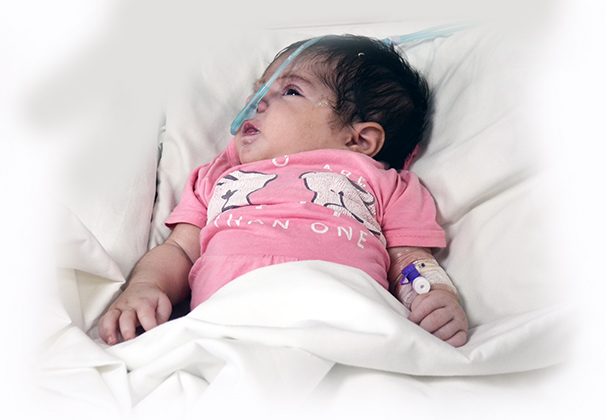A lifesaving procedure to make a lifelong memory
Balloon Atrial Septostomy for the first time in Afghanistan 
Meet Marwa, a 7-day-old baby girl with a congenital heart disease which is called Transposition of the Great Arteries (TGA). Her journey of treatment started when her mother noticed the unusual dusky colour of her skin and rapid breathing since she was born.
She said, “Marwa was not normal from the beginning, she was suffering from an unknown disease and it was a clue for us to find an immediate treatment before it’s late.”
Unfortunately, the recent changes in Afghanistan affected the entire healthcare system, and it was a challenge to find an ensured healthcare in the country. A gleam of hope appeared when she decided to visit FMIC, where the healthcare workers were available and the services continued to serve the Afghan patients.
When Marwa was brought to FMIC, her condition was not stable. She needed to be shifted to the Neonatal Intensive Care Unit (NICU) immediately. The cardiology and Neonatology teams of FMIC noticed that the oxygen saturation and the blood pressure of the baby are very low. As a result, she was connected to an oxygen tube and availed of the inotropic support.
The diagnosis started with echocardiography and some lab tests. It was noticed that little Marwa is suffering from a TGA, a condition in which the two Great Arteries which convey blood out of the heart aren’t normally connected and there is a restricted interatrial communication which is not sufficient for proper mixing of the blood. A very complicated case!
She needed a “Balloon Atrial Septostomy” a procedure in which the baby will be shifted to an equipped Cath Lab with a complete team of cardiologists, nurses, anaesthetists and radiologists to expand an atrial septal defect and save the life of the patient before an Arterial Switch Surgery.
The procedure started by an orchestrated and complete team and after a one-hour meticulous procedure, the first Balloon Atrial Septostomy was performed successfully. The outcome of the procedure was outstanding: Marwa’s condition improved enough to be extubated and shifted to a normal ward under observation and monitoring of doctors and nurses. Finally, all the vital signs of Marwa revived.
After this successful and lifesaving procedure, Dr Khalil Ahmad Niazy, FMIC paediatric cardiologist said: “This procedure is performed successfully because of our teamwork, knowledge and commitment.”